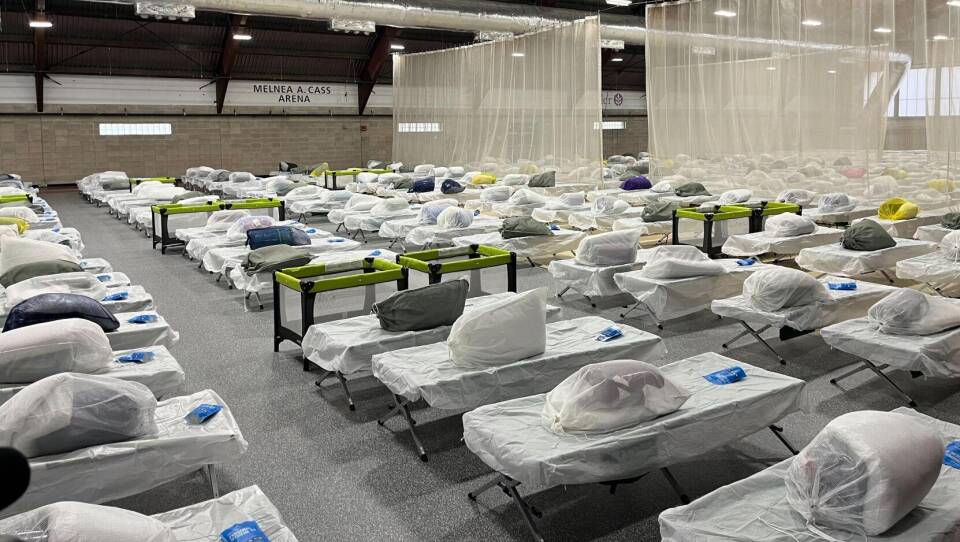Homeless residents and migrants living in state overflow sites will have to re-apply for their safety-net shelter spots every month starting May 1, state officials said Monday.
Members of the Healey administration say they will require families to “document engagement in case management and rehousing efforts monthly,” to maintain their eligibility to remain in the state's temporary housing.
The new regulations affects about 200 families currently living in overflow sites located in Cambridge, Roxbury, Quincy and Revere. They are meant for eligible families on a waitlist for emergency assistance in the state's main shelter system, currently at capacity with over 7,500 families.
Emergency Assistance Director General Scott Rice said the state system is “at capacity” and unable to expand further.
“This new certification policy is a responsible step to address the capacity constraints at our safety-net sites,” Rice said in a press release. “Families will need to demonstrate that they’ve taken action to get on a path toward independence and out of shelter.”
Families will be evaluated on whether they have participated in state-provided services meant to help them move toward independence, including applying for work authorization, participating in a workforce training program, taking English classes and searching for housing.
Some immigrant rights organizations told GBH News they were taken aback by the announcement.
“We think this is a bad thing. It’s going to be up to a lot of the service providers to be doing the work and re-certifying these folks every month,” said Sarang Sekhavat, chief of staff at Massachusetts Immigrant and Refugee Advocacy Coalition, which helps with work authorization applications at shelter sites.
Sekhavat said the new rules were “unexpected.” The brunt of the labor of new data collection, he said, would fall on already overworked providers. It’s also unclear how migrants will be able to prove they’re taking part in programs, applying for housing, and work authorization. The gap in steps forward, he said, are unclear, as is the reasoning.
“What does it even mean? You know, to be going after work authorization — you submit your work authorization application,” Sekhavat said. “There's nothing for you to actually do for months. So why do you need to re-certify this stuff?”
Gov. Maura Healey spoke to reporters Monday about the coming changes.
"I think it is entirely necessary to impose requirements and to make sure that people are fulfilling those requirements if we're going to continue to allow folks to stay in these safety-net sites. I think it's an appropriate and responsible measure," she said. "My hope and expectation is that people will comply, because if you comply, then you'll be that much sooner on the road to independence and not in need of shelter, and so that's the goal here."
A spokesperson for the state pushed back on some of advocates’ concerns. Providers are already operating these services for overflow sites and know who is participating, according to the state. The state also said that it runs legal services programs at the sites, and know which overflow recipients are participating.
“Shelter providers and case managers will work with families to make sure they are aware of the policy, conduct case management and diversion assessments, and help them engage in services and apply for re-certification,” according to the state.
Some organizations feel like the focus of proving that asylum seekers are looking for work and housing is taking away from the focus on other urgent concerns.
“A lot of families aren't connected to primary care and have a lot of urgent medical and mental health needs,” said Dr. Aura Obando, who is the family team medical director for Boston Health Care for the Homeless Program. The organization is helping new arrivals staying at the Melnea Cass Recreational Complex in Roxbury.
She said searching for housing and employment can be impossible without addressing health issues first.
Obando hopes that those medical hurdles are taken into consideration with the new requirements “so that families that might have pretty severe depression or trauma may be give leeway with meeting these requirements,” she said.
An additional safety-net site will be opening in April in the vacant former Chelsea Soldiers' Home facility, slated to accommodate about 100 families. The spot is owned by the state and is slated to be demolished following the opening of a new Massachusetts Veterans Home last year.
Healey said that her administration picked the former Chelsea Soldiers' Home as a new overflow shelter because it was vacant, set to be demolished "and could be quite easily and readily repurposed into a safety-net site."
Dr. Jon Santiago, secretary of the state’s Department of Veterans Services, said the new project “operates independently and will not impact the daily routines,” of the new home for veterans. “Massachusetts has proven that we can take care of veterans and families experiencing homelessness in our state,” he said.
The rules will not apply to United Way of Massachusetts Bay safety net sites, which are for emergency assistance eligible families who are on the waitlist, but are funded through a different grant-funded program.
The emergency shelter program is intended for families with children or pregnant women who are experiencing homelessness. The state says less than half of the families in the program are new arrivals to the area.
Katie Lannan contributed reporting.








